
"I Can't Get Next to You" is a 1969 No. 1 single recorded by the Temptations and written by Norman Whitfield and Barrett Strong for the Gordy (Motown) label. The song was a No. 1 single on the Billboard Top Pop Singles chart for two weeks in 1969, from October 18 to October 25, replacing "Sugar, Sugar" by the Archies and replaced by "Suspicious Minds" by Elvis Presley. The single was also a No. 1 hit on the Billboard Top R&B Singles for five weeks, from October 4 to November 1, replacing "Oh, What a Night" by the Dells, and replaced by another Motown song, "Baby I'm For Real" by the Originals.
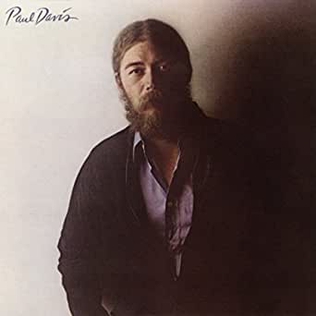
Paul Lavon Davis was an American singer and songwriter, best known for his radio hits and solo career that started worldwide in 1970. His career encompassed soul, country, and pop. His most successful songs are 1977's "I Go Crazy", a No. 7 pop hit that once held the record for the longest chart run on the Billboard Hot 100, and 1982's "'65 Love Affair", which at No. 6 is his highest-charting single. Another pop hit, "Cool Night", was released in 1981. In the mid-1980s, he also had two No. 1 country hits as a guest vocalist on songs by Marie Osmond and Tanya Tucker.

"Are You Lonesome Tonight?" is a song written by Roy Turk and Lou Handman in 1926. It was recorded several times in 1927—first by Charles Hart, with successful versions by Vaughn De Leath, Henry Burr, and the duet of Jerry Macy and John Ryan. In 1950, the Blue Barron Orchestra version reached the top twenty on the Billboard's Pop Singles chart.

"Black and White" is a song written in 1954 by David I. Arkin and Earl Robinson (music). It was first recorded by Pete Seeger featuring an African-American child, in 1956 from the album Love Songs for Friends & Foes.
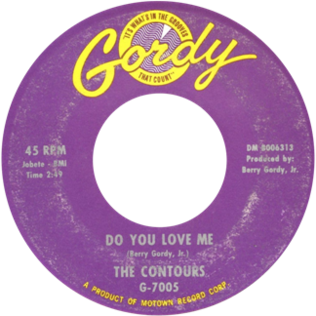
"Do You Love Me" is a rhythm and blues song recorded by the Contours in 1962. Written and produced by Motown Records owner Berry Gordy Jr., it appeared twice on the Billboard Hot 100 chart, reaching numbers three in 1962 and eleven in 1988.

"Yes, I'm Ready" is a song by Barbara Mason from her album Yes, I'm Ready (1965). It has been covered by numerous artists, and was a hit single for Teri DeSario and K.C. when they recorded a duet version in 1980.
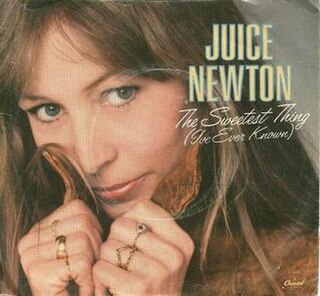
"The Sweetest Thing (I've Ever Known)" is a country-pop song written by Otha Young for Juice Newton in the mid-1970s. Newton was known for charting hits on the Hot 100, Adult Contemporary, and Hot Country charts - and this song has the distinction of being the only single of hers to reach the top 10 on all three of those charts, peaking at #1 on two of them.
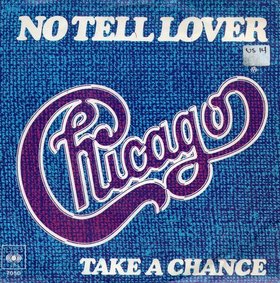
"No Tell Lover" is a song written by Lee Loughnane, Danny Seraphine, and Peter Cetera for the group Chicago and recorded for their album Hot Streets (1978), with Cetera and Donnie Dacus singing lead vocals. The second single released from that album, it reached No. 14 on the U.S. Billboard Hot 100 chart and No. 5 on the adult contemporary chart.
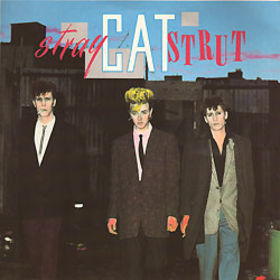
"Stray Cat Strut" is the third single by American rockabilly band Stray Cats, released April 17, 1981 by Arista Records in the UK, where it peaked at No. 11 on the Singles Chart. It was taken from the band's 1981 debut album, Stray Cats. That same year, as an import, it peaked at No. 78 on the US Disco Top 80 chart.
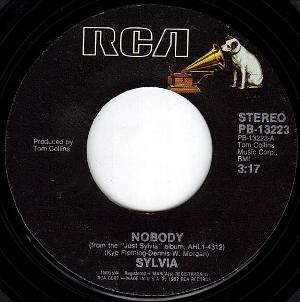
"Nobody" is a song written by Kye Fleming and Dennis Morgan, and recorded by American country music artist Sylvia. It was released in June 1982 as the second single from the album Just Sylvia.

"Slow Hand" is a song recorded by American vocal group The Pointer Sisters for their eighth studio album Black & White (1981). The song, written by Michael Clark and John Bettis, was released by the Planet label in May 1981 as the lead single from Black & White.
"Wedding Bell Blues" is a song written and recorded by Laura Nyro in 1966. The best known version was a number one hit for the 5th Dimension in 1969.
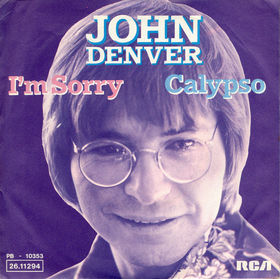
"I'm Sorry" is a song written and recorded by American country-folk singer-songwriter John Denver and released in 1975. It was the final number-one pop hit released during his career.

"Love or Let Me Be Lonely" is a pop song recorded by the soul group The Friends of Distinction and released as a single in early 1970. The song was a multi-format success, peaking in the top 10 of the Billboard Hot 100 at #6 on May 1, 1970 and at #13 on the R&B chart. On the Adult Contemporary singles charts, "Love or Let Me Be Lonely" went to #9. The song is ranked as the 63rd biggest hit of 1970.
"My Boy" is a popular song from the early 1970s. The music was composed by Jean-Pierre Bourtayre and Claude François, and the lyrics were translated from the original version "Parce que je t'aime, mon enfant" into English by Phil Coulter and Bill Martin.

"We'll Never Have to Say Goodbye Again" is a song by Jeffrey Comanor from the album A Rumor in His Own Time, which debuted in September 1976. Written by Comanor, the song describes a couple who spend a night together, one which the narrator wishes would "never end". Both the song, which Epic Records released as a single, and album failed to chart.

The singles discography of Elvis Presley began in 1954 with the release of his first commercial single, "That's All Right". Following his regional success with Sun Records, Presley was signed to RCA Victor on November 20, 1955. Presley's first single with RCA, "Heartbreak Hotel", was a worldwide hit, reaching the No. 1 position in four countries and the top 10 in many other countries. Other hit singles from the 1950s include "Don't Be Cruel", "Hound Dog", "Love Me Tender", "Too Much", "All Shook Up", "(Let Me Be Your) Teddy Bear", "Jailhouse Rock", "Don't", "Hard Headed Woman" and "A Big Hunk o' Love". On March 24, 1958, Presley entered the United States Army at Memphis, Tennessee, and was stationed in Germany. He left active duty on March 5, 1960.

"Never Ending Song of Love" is a song written by Delaney Bramlett, and, according to some sources, by his wife Bonnie Bramlett. It was originally recorded with their band, Delaney & Bonnie & Friends, in 1971 on the album Motel Shot. Released as a single by Atco Records the same year, "Never Ending Song of Love" became Delaney & Bonnie's greatest hit on the pop charts, reaching a peak of No. 13 on the Billboard Hot 100 and No. 8 on Easy Listening. It reached No. 16 in Australia.

Ear Candy is the ninth studio album by Australian-American pop singer Helen Reddy, released on 25 April 1977 by Capitol Records. The album included a modern take on the doo-wop genre, a Cajun number that gave the Melbourne native her first and only appearance on Billboard magazine's Country chart, and a dark self-parody on which Reddy proclaims: "I don't take no shit from nobody". Unusually, half of the songs recorded for Ear Candy were co-written by Reddy herself, including the second single, "The Happy Girls", Reddy's first self-penned A-side single since "I am Woman". The album's first single, a remake of the 1964 Cilla Black hit "You're My World", gave Reddy a final Top 40 hit.

"We're in This Love Together" is a 1981 hit song by Al Jarreau. It was the first of three single releases from his fifth studio album, Breakin' Away. The song was his first and biggest chart hit.

















